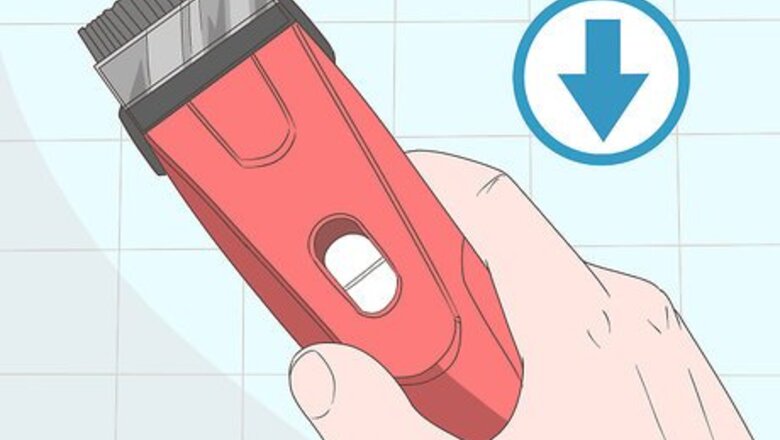
views
Trimming Pubic Hair for Men
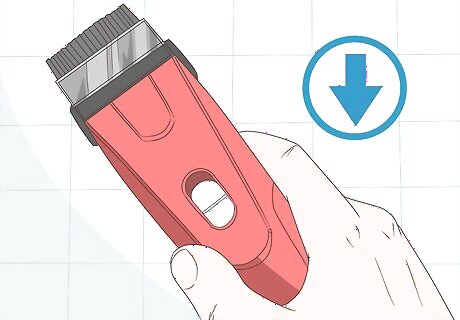
Place the lowest guard setting on your electric grooming clippers. It’s possible to use hair clippers here, but grooming clippers are smaller and more maneuverable since your pubic area is a sensitive place. When you use the lowest guard setting, the clippers should trim your hair to 0.125 in (3.2 mm) or less in length. Never shave your pubic hair without trimming it first—the coarse, curly hairs will get caught in the razor and be painfully yanked out! If you only intend to trim (and not shave) your pubic hair, you can use a higher guard setting, if desired. You could remove the guard altogether for an even closer trim, but this increases the chances of nicks, cuts, irritation, and infection.
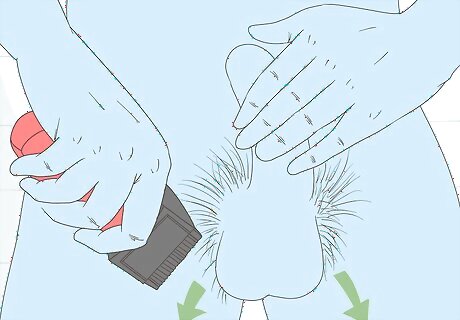
Glide the clippers through the hair surrounding your genitals. Stand upright, hold the clippers in your dominant hand, and use your other hand to maneuver your penis and scrotum out of the way as needed. Cut through the pubic hair in the direction of growth—which is typically downward above your penis, for example. You can also use your free hand to pull your skin taut as you work—this may make trimming the hair easier. You may find it easier to work if you put one leg at a time on a chair, the toilet lid, or the side of the tub.
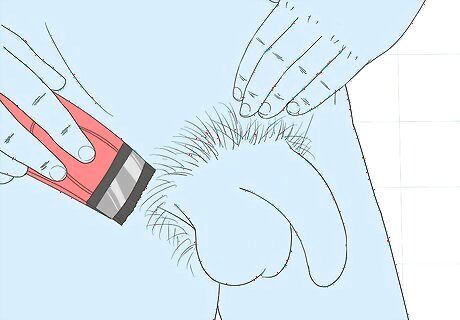
Work carefully to trim any hair on your scrotum and penis. After you’ve trimmed down the pubic hair surrounding your genitals, very slowly glide the clippers over the shaft of your penis (if necessary) to trim any hairs there. Then, use your free hand to provide clear access to one area of your scrotum at a time, and carefully trim the hair in those spots. When trimming your scrotum, try to create fairly flat, taut areas of skin with your free hand. Otherwise, it’s possible that your scrotum’s loose skin might get caught in (and be cut by) the clipper blades—ouch! You may find it easier to trim the hair on an erect penis.
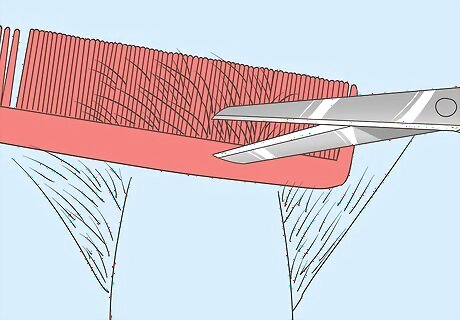
Use a comb and scissors if you don’t have clippers. Starting at the outer edge of your pubic hair, slide the teeth of the comb into a small section of hair. Work against the direction of hair growth and keep the comb flat against your skin. Use sharp scissors to snip off the hair that extends above the teeth of the comb, then move onto another section and continue. Follow the same procedure to trim any hair on your scrotum and penis. Sharp scissors do a much better job here, but you have to be very careful not to cut into the skin—doing so can easily lead to an infection. Don’t use this comb and scissors for anything else, and clean them thoroughly with rubbing alcohol afterward. This reduces the risk of spreading an STI or other infection.
Shaving the Trimmed Pubic Hair
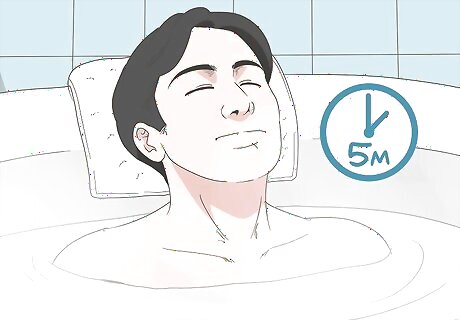
Soak in a warm tub for 5 minutes. The warm water will soften your skin and hair, making it easier for the blade of the razor to glide over your skin and cut off the individual hairs near the base. A warm shower will also help, though soaking in a tub provides the best results. Soaking for longer than 10 minutes may, in some cases, cause your skin to puff up and make it more difficult to shave. Soak in the tub after you have trimmed your pubic hair with electric grooming clippers.
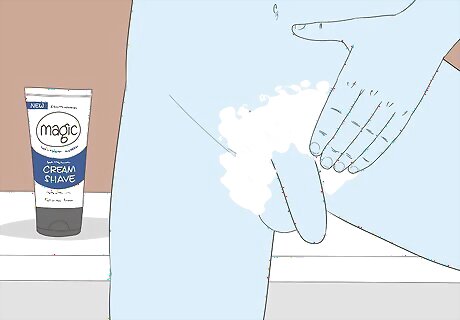
Massage shaving cream into your pubic hair. You can use a shaving cream or gel intended specifically for body hair, or just rely on a standard shaving cream. Use your hands to work it into the hair for 1-2 minutes. Massaging it in will further soften the hair and lubricate your skin. You can also use a shaving cream applicator brush to work the shaving cream in. However, to reduce the risk of spreading an STI or other infection, don’t use the same brush on your face.
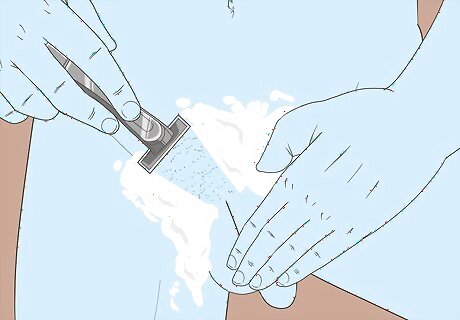
Shave around your genitals with smooth, even strokes. Stand in the tub or another spot where you can prop up one leg at a time to help access your groin area. Hold a sharp, clean razor in your dominant hand, and use your free hand to position your genitals as needed to access the pubic hair that surrounds your penis and scrotum. Use even pressure to glide the razor over the hair in the direction of hair growth. Rinse the razor in clean water after every 2-3 strokes, and make sure the blade is clear of hair and shaving cream. Using a dull razor means you have to apply more pressure, which is more likely to lead to cuts and irritation. Stick with a sharp, fresh razor. Also, don’t use this razor on your face or any other area of your body.
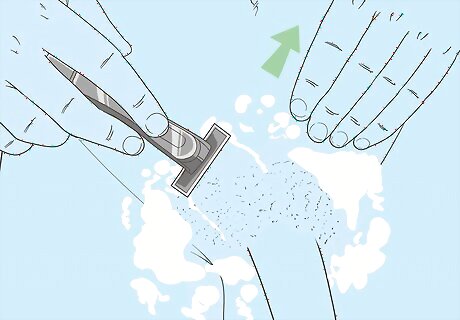
Pull the skin taut for a closer shave, but beware of cuts and irritation. Using your free hand to pull the skin around your genitals taut will result in less stubble and a closer shave. However, shaving this closely also increases the likelihood of skin irritation, nicks, and cuts. These, in turn, can lead to infections. Close shaving on and around your genitals may also increase the chances of spreading STIs—you may, for instance, cut open sores that you don’t even realize you have. Basically, if you don’t mind having a bit of a “5 o’clock shadow” in your groin area, don’t try to shave as closely as possible.
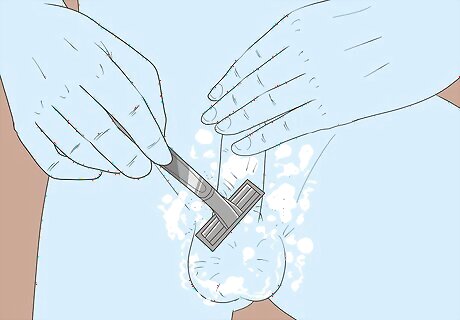
Shave your scrotum and penis very carefully and only if necessary. These areas are very sensitive and difficult to shave without causing nicks and cuts. If you do shave your penis and balls, use your free hand to flatten out small sections and glide the razor over them with smooth, even strokes—apply as little pressure as necessary. Unless you’re absolutely determined to be completely smooth “down there,” stick with just using the clippers to trim any hair on your penis and scrotum. Wondering if you should shave your penis? Shaving is a personal choice, so it’s completely up to you. About 19% of men go completely hairless in their pubic area. 24% of women say they prefer a hair-free sexual partner, while 60% of men say they prefer a hair-free sexual partner.
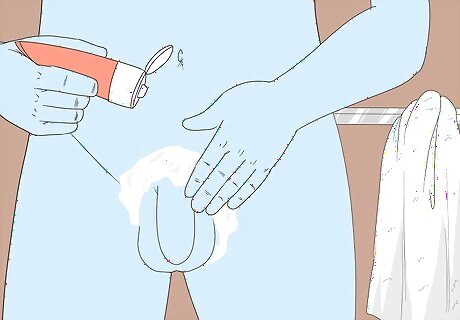
Rinse and dry the area, then add a soothing lotion or balm. Once you’ve finished shaving, rinse your groin area with a generous amount of clean, warm water. Then, pat it dry with a clean, soft towel. After that, apply an alcohol-free, fragrance-free, gentle aftershave lotion or balm. Doing so will help reduce your chances of irritation or infection. You can also try using aloe vera or baby oil as aftershave. If you do develop a rash or itching, soak in a warm tub for 5-10 minutes at least once daily, pat the area dry, and reapply your aftershave after each soak. If needed, contact your doctor for recommendations on OTC topical treatments (like hydrocortisone creams), or schedule a visit. See your doctor right away if you develop a severe rash, oozing, bleeding sores, and/or a fever.
Other Pubic Hair Removal Options for Men
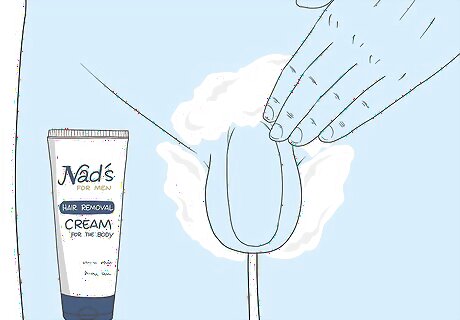
Use an OTC depilatory only if it’s listed for use on genitals. Depilatories use chemicals to essentially dissolve hair away, and not all types are safe to use on sensitive areas like your genitals. If the product is listed as safe for use on genitals, apply the cream and rinse it away as per the product instructions. The depilatory may leave you with smoother skin than you can get by shaving, but the hair will begin to grow back within a similar time frame—usually a few days. If you notice a great deal of redness or swelling, you may be allergic to the depilatory. Stop using it and contact your doctor.
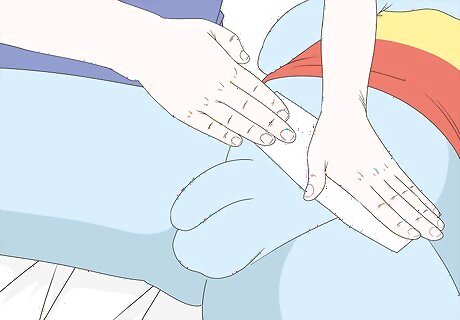
Have the area professionally waxed for longer-lasting results. Waxing rips out each hair root and all, meaning it will take longer for new hairs to appear in your groin area—maybe 1-2 weeks or more. However, waxing is mildly to moderately painful, and it’s particularly difficult to wax your own groin area at home. Instead, go to a salon that offers waxing services for private areas of the body. To reduce your risk of infection, make sure the salon uses fresh wax and clean equipment for each customer.
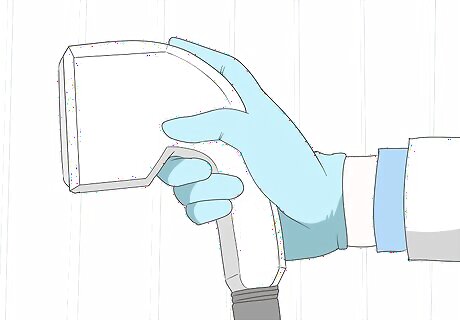
Rely on laser hair removal for even slower regrowth. Laser hair removal destroys individual hair follicles, which means you may have smooth skin for weeks or months afterward. However, laser treatments usually require multiple sessions (up to 5) lasting up to an hour, done at the office of a dermatologist or similar professional. Although laser treatments work well for most people, they may prove ineffective in removing your pubic hair. The procedure may be mildly painful, but likely less so than waxing. You may notice some redness and swelling after each session. If needed, ask for recommendations on soothing the area, possibly by soaking in the tub or applying a soothing balm or lotion.
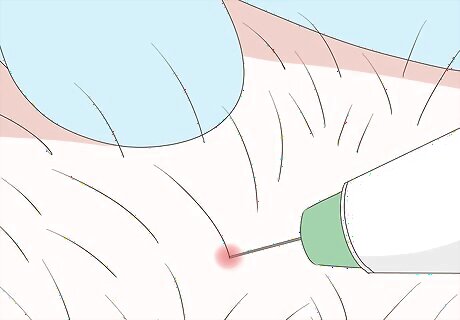
Use electrolysis treatments to permanently prevent hair growth. If you’re sure you never want to have pubic hair again, electrolysis may be worth your time and money. For this procedure, a professional uses a needle-like device to destroy the roots of each hair. It can take up to 25 sessions to complete the procedure, but the roots will be completely destroyed and not regenerate afterward. You may experience mild pain during each session. You might also have temporary redness or irritation, which may require the application of a soothing balm or lotion. This is likely to be the most expensive option, especially since it requires so many visits to a dermatologist (or similar professional) office.















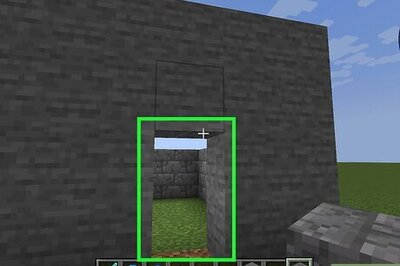

Comments
0 comment